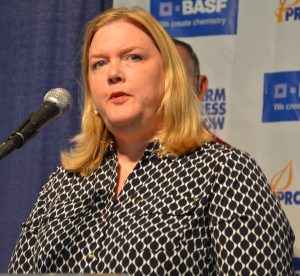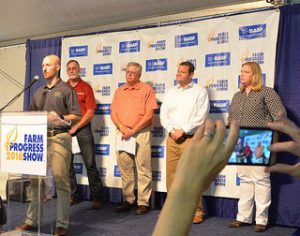
Jill Kolling, Senior Director of Sustainability for Cargill announced the new Midwest Row Crop Collaborative during the 2016 Farm Progress Show.
During the Farm Progress Show this morning a new initiative was announced to add more support to on-farm conservation programs and practices: The Midwest Row Crop Collaborative. One of the Collaborative’s first actions is to raise $4 million dollars over five years to support Soil Health Partnership (SHP). The initiative was created to support, enhance and accelerate the use of environmentally preferable agricultural practices. The collaboration includes environmental, food and ag companies.
Founding members of the Midwest Row Crop Collaborative include: Cargill, the Environmental Defense Fund, General Mills, Kellogg Company, Monsanto, PepsiCo, The Nature Conservancy, Walmart and the World Wildlife Fund. The overarching goal is to help achieve a 45 percent nutrient loss reduction by 2035 across the Upper Mississippi River Basin, in particular nitrogen and phosphorus.
“Through healthy soil, farmers can play a major role protecting water quality and the environment—while also optimizing their crop yields and economic returns,” said Nick Goeser, director of the SHP. “We’re honored to welcome the Midwest Row Crop Collaborative to our program. Their support will amplify our research and communications efforts in helping farmers find practices that work best for them.”

Speaking is Nick Goeser, Soil Health Partnership. Behind him from left to right: Roger Zylstra, Iowa farmer, Larry Clemens, The Nature Conservancy, Ryan Irsilk, Walmart and Jill Kolling, Cargill.
To date, more than 65 farm sites are already enrolled in the SHP program an initiative of the National Corn Growers Association. The new alliance will help SHP achieve the goal of enrolling at least 100 farms over the next two years. According to SHP’s Director, Nick Goeser, this additional support re-iterates their program as a leader in field-scale and measuring of management practices that improve soil health that include:
- Growing cover crops to prevent erosion and nutrient losses,
- Implementing conservation tillage like no-till or strip-till, and
- Using advanced, science-based nutrient management techniques to reduce nutrient loss.
Roger Zylstra, a farmer from Lynnvill, Iowa who participates in the SHP program, added, “As a farmer, I am committed to soil health because I know we have to constantly improve how we care for our land and how we farm it. This funding commitment is significant to me because now we have more support from the large food and ag companies as well as environmental groups pushing for change. They’re showing us we don’t have to do it alone.”
Midwest Row Crop Collaborative Presser


